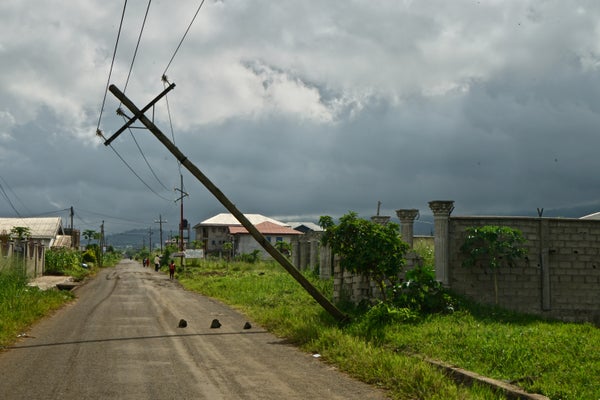COVID-19 has spurred massive changes in how the world works, learns and does business—changes made possible by the internet and digital infrastructure.
But without power, there is no internet. The entire digital ecosystem relies so heavily on reliable, affordable electricity, from home internet connections to the base stations that underpin cellular networks to the data centers that store the internet’s content. This means that countries with weak power infrastructures—which were already struggling to compete in the new digital economy—are facing bleak prospects in a post-lockdown world in which Zoom, Dropbox and Google Classroom are the new office or school.
Sub-Saharan Africa, where the digital transition has long been touted as a way to leapfrog traditional infrastructure, is especially vulnerable to falling behind. Chronic challenges in the power sector here—such as low electrification rates, high prices and appalling reliability—have significantly impacted the region’s digital competitiveness.
On supporting science journalism
If you're enjoying this article, consider supporting our award-winning journalism by subscribing. By purchasing a subscription you are helping to ensure the future of impactful stories about the discoveries and ideas shaping our world today.
And COVID-19 is already widening this gap across the region. Lack of electricity, for instance, is undermining Kenya’s ability to deliver its remote learning initiative, while professionals stuck working from home are faced with frequent internet disruptions due to a weak power grid that has been impacted by heavy rains, vandalism and technical faults during the lockdown. Even South Africa, which has by far the most power capacity on the continent, will struggle to power basic mobile data for simple WhatsApp calls once its dramatic “load-shedding” program of scheduled countrywide blackouts is reinstituted after the lockdown ends.
The power-internet gap in sub-Saharan Africa will only get wider in an increasingly digital post-COVID world, if current energy system challenges remain unaddressed. This vicious cycle in the power-internet nexus is best exemplified by the data centers that sit at the core of the internet's infrastructure—centralizing data storage, computing power and networking equipment. Data centers drive energy efficiency in the digital ecosystem as they concentrate equipment and processes, but as such they are large power consumers with strong sensitivity to changes in electricity cost and reliability. In fact, power generally represents two thirds of their operating costs.
Demand for more Africa-based data centers is growing dramatically to serve the continent's burgeoning internet use with low-latency and high-bandwidth connectivity. Africa's data center industry is expected to grow to 600 megawatts in 2020—and just that growth alone represents a projected capital investment of more than $1 billion in the region. Notably, it is local African businesses, including Vodacom/Safaricom, MTN, Rack Center Nigeria, Africa Data Centers and Teraco that are at the forefront of this growing industry, owning more than 95 percent of data center capacity in the region. But without cheap and reliable power, data centers won't get built in Africa—wasting a tremendous economic opportunity.
And without robust data center development, activities with hefty data requirements like remote work, digital classrooms, video streaming and data analytics—all especially needed in the COVID-19 era—will start to crumble. And sub-Saharan Africa will start to see slower growth in its technological industries overall. No power, no digital transformation.
The same factors that make data centers such a challenge for business-as-usual approaches to energy in sub-Saharan Africa should also make them the catalyst for new approaches that could finally begin to close the continent's energy gap.
Governments and actors in the information and communications technology (ICT) and power sectors need to seize the moment and come together to solve sub-Saharan Africa's power-internet nexus challenge.
Governments must put solving power at the heart of spurring Africa’s digital transformation. Ministries of information and communication technology need to turn to their ministry of energy colleagues and emphasize, “No power, no digital transformation.”
And governments need to support and hold accountable their local utilities to increase grid capacity, improve the overall health of our power systems, invest in infrastructure across transmission and distribution, and increase reliability. In the current pandemic moment, governments must especially recognize the power and ICT sectors both as responses to the current crisis and as building blocks for long-term resilience.
Data centers can also drive the solution, offering immense collaborative possibilities between the ICT and power sectors for transforming how and at what cost power is delivered to the region.
They can be a new source of stable long-term revenue for the many utilities that are in financial distress and hungry for creditworthy customers. This is because data centers offer utilities a new category of the reliable, large-scale, 24/7 electricity consumer—one that uses power “off-peak” at night, which otherwise often goes to waste.
Moreover, data centers can actually improve the technical quality of the grid—both through their own investments and in partnership with utilities. Often, data centers will pay the local utility to build out the substations and large capacity power lines to their site, public infrastructure that later benefits other customers.
Plus, many global data center customers are demanding renewable or low carbon power. This provides a willing customer aligned to government mandates to boost renewable energy generation. Recognizing that digital infrastructure can benefit the growth of the entire power sector, sub-Saharan Africa utilities can develop specific strategies to attract “anchor ICT customers” through expedited power connections, aligned tariffs, and availability of renewable energy.
The COVID-19 pandemic has deepened the reliance of every nation on the digital economy—and has exposed the lack of readiness in sub-Saharan Africa to provide inexpensive, reliable and abundant power to that economy moving forward.
This lack of readiness isn't just about the health emergency facing the region now. It's about the economic emergency that the region will face if decision-makers don't prioritize a robust ICT-power sector partnership.
No power, no internet, no digital transformation. And no chance of making sub-Saharan Africa more economically competitive in a world recovering from COVID-19 where being digital is assumed, not aspirational.
